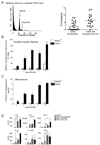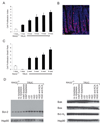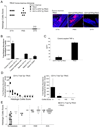Colitis-associated colorectal cancer driven by T-bet deficiency in dendritic cells
- PMID: 19732721
- PMCID: PMC2740755
- DOI: 10.1016/j.ccr.2009.07.015
Colitis-associated colorectal cancer driven by T-bet deficiency in dendritic cells
Abstract
We previously described a mouse model of ulcerative colitis linked to T-bet deficiency in the innate immune system. Here, we report that the majority of T-bet(-/-)RAG2(-/-) ulcerative colitis (TRUC) mice spontaneously progress to colonic dysplasia and rectal adenocarcinoma solely as a consequence of MyD88-independent intestinal inflammation. Dendritic cells (DCs) are necessary cellular effectors for a proinflammatory program that is carcinogenic. Whereas these malignancies arise in the setting of a complex inflammatory environment, restoration of T-bet selectively in DCs was sufficient to reduce colonic inflammation and prevent the development of neoplasia. TRUC colitis-associated colorectal cancer resembles the human disease and provides ample opportunity to probe how inflammation drives colorectal cancer development and to test preventative and therapeutic strategies preclinically.
Figures





References
-
- Boivin GP, Washington K, Yang K, Ward JM, Pretlow TP, Russell R, Besselsen DG, Godfrey VL, Doetschman T, Dove WF, et al. Pathology of mouse models of intestinal cancer: consensus report and recommendations. Gastroenterology. 2003;124:762–777. - PubMed
-
- Bui JD, Schreiber RD. Cancer immunosurveillance, immunoediting and inflammation: independent or interdependent processes? Curr Opin Immunol. 2007;19:203–208. - PubMed
Publication types
MeSH terms
Substances
Grants and funding
LinkOut - more resources
Full Text Sources
Other Literature Sources
Medical
Molecular Biology Databases

